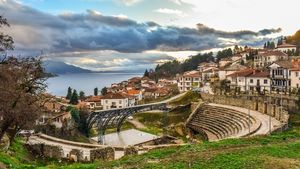The Republic of Macedonia is about a third the size of Scotland, surrounded by Greece, Albania, Kosova, Serbia and Bulgaria. It gained independence when Yugoslavia broke up in 1991, and has a population of two million, of whom one third are Albanians living mainly in the western part.
Readers should not think that the Albanians left Albania and came to Macedonia. Rather, the Great Powers, who determined the borders at the London conference in 1913, took little account of where different ethnic groups lived and awarded these areas to a new country called ‘Yugoslavia’.
Recent fighting
The capital of Macedonia is Skopje, which has about 600,000 inhabitants, including 113,000 Albanians. Until the recent growth of Tirana, Skopje had more Albanians than any other city in the world.
The second largest Macedonian city is Tetova, with a population of about 200,000, of whom perhaps 80% are Albanian. It is around Tetova that recent fighting has concentrated, threatening the outbreak of yet another widespread Balkan war.
NATO intervened on behalf of the Albanians in Kosova in 1999. The Macedonian government allowed NATO troops to use their territory and Albanian refugees to enter their country temporarily.
But the Slav population in Macedonia tended to side with the Serbs against the Albanian refugees. The Slav attitude does not spring from moral grounds, but from racial and religious kinship.
So when Albanians took up arms in March this year against the Macedonian government, the Slavs blamed NATO. They claimed that by backing Albanians in Kosova NATO had raised expectations among the Albanians in Macedonia for similar support.
Solidly Moslem
The Slav people are solidly Macedonian Orthodox — a religion which to Evangelicals seems much like Catholicism without the pope. It features salvation via the priesthood and the sacraments; doctrinal authority flowing from the church’s tradition; and prayer to the saints.
But the Albanians are solidly Moslem, and to change religion is to deny a person’s ‘Albanian-ness’, to turn one’s back on family, forefathers, community and heritage.
Not only do Christian evangelists encounter the innate hardness of the human heart against the gospel, but also face a situation in which a Moslem feels he is betraying everything if he turns to Christ.
Furthermore, the fact that Albanians are a minority, living under the threat of civil war, makes it immeasurably harder for them to consider leaving their traditions.
No church
Understandably, therefore, there are very few Evangelical believers among the Macedonian Albanians, maybe a dozen. The first converts seem to have been a married couple who found Christ whilst working in the West. A small number of others have come to Christ in the last four years or so.
Any Albanian in Macedonia who does so will come from a Moslem background. A high percentage will experience great opposition and difficulty from family and friends, and the cost of discipleship will be great. Some will go back into the world: some, indeed, have.
There is no Albanian church in Macedonia, and the few believers are dispersed among various Slav-speaking churches. There has as yet been no serious attempt to plant an Albanian church, either by Albanian believers or by foreigners living among them.
No missionaries
There are no missionaries in Macedonia. Those foreigners who are actively serving the Lord there are engaged in business or other work.
It is not particularly difficult to obtain a visa to work and live in Macedonia. British people can remain for a remarkably long time as tourists.
Whether you live for a long time on a tourist visa, or set up your own business, you are free to join in the ministry of the local church, or to attempt by personal witness and conversation to plant a church. You are not a missionary but you are a Christian serving your Lord in Macedonia.
Please pray for workers to be raised up for Macedonia. The Albanian Evangelical Mission has no personnel there at present, though we have some contacts. We did have three members there a while back, but they are all now living in Albania.
Confidential enquiries would be welcomed with a view to strengthening the Lord’s work in that land. Pray also for peace in the region and for the Macedonian government to receive wisdom from on high






